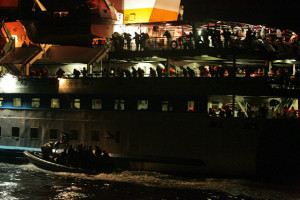By Dr Miša Zgonec-Rožej*
The decision to not investigate alleged war crimes during the raid on a Gaza-bound humanitarian flotilla in 2010 comes as no surprise, but it highlights the uncertain legal situation surrounding the Rome Statute’s applicability to the Israeli-Palestinian situation.

Passengers look down from the Turkish passenger ship Mavi Marmara as the Israeli navy intercepts boats bound for Gaza on 31 May 2010 – ©Getty Images
On 5 November, the International Criminal Court decided not to proceed with an investigation into alleged war crimes committed by Israeli soldiers during their raid on a Gaza-bound humanitarian flotilla in 2010. Despite acknowledging a reasonable basis to believe that war crimes were committed on one of the vessels, the Mavi Marmara, the prosecutor concluded that the potential case was not of sufficient gravity to justify further action by the ICC. The decision comes as no surprise.
Due to its limited resources, the ICC was never intended to deal with all crimes falling within its jurisdiction. The assessment as to which case meets the threshold of sufficient gravity is based on the scale, nature, manner of commission of the crimes and their impact. Given that the court lacks jurisdiction to investigate any other alleged crimes committed in the context of the Israel-Hamas conflict or in the broader context of the Israeli-Palestinian conflict, the prosecutor concluded that the requisite threshold was not met because the potential case(s) would be limited to an event encompassing a small number of victims of the alleged war crimes.
Although the ICC does not have jurisdiction over crimes in Israel because Israel has refused to ratify and accede to the Rome Statute, the court can act in relation to the conduct of non-party state nationals alleged to have committed war crimes on the territory of an ICC state party or on their vessels and aircrafts. The Mari Marmara was registered in Comoros, which has been a state party to the Rome Statute since 1 November 2006, so the flotilla incident fell within the ICC’s jurisdiction. The request to initiate an investigation into the crimes arising from the flotilla raid was submitted to the ICC prosecutor by the government of Comoros. The prosecutor’s decision marks the first time that the referral of a situation by a state party to the Rome Statue has been rejected.
Some consider the prosecutor’s decision as yet another blow to the efforts to bring before the ICC international crimes allegedly committed in relation to the Israeli-Palestinian conflict. In 2009, Palestine lodged a declaration under Article 12(3) of the Rome Statute accepting the ICC’s jurisdiction, but two years later the Prosecutor decided to close the preliminary examination of the situation in Palestine because of uncertainties surrounding Palestine’s statehood. On 29 November 2012, the UN General Assembly adopted Resolution 67/19 which upgraded Palestine’s status at the UN from ‘observer entity’ to ‘non-member observer State’. The ICC prosecutor, however, stated that this decision did not retroactively validate the 2009 declaration.
Nevertheless, with the UN General Assembly decision to accord Palestine ‘non-member observer State’ status, doubts as to whether Palestine can become a party to the Rome Statute, which is open to accession by states only, seem to have been removed. The ICC prosecutor stated that Palestine could now join the Rome Statute. As regards Palestine’s statehood before the UN General Assembly’s vote, the prosecutor considered in the Mavi Marmara decision that hostilities in 2010 between Israel and Hamas did not qualify as an international conflict between two states. Contrary to the Israeli position that Israel is no longer occupying Gaza, the ICC prosecutor confirmed the prevalent view within the international community that Israel, given the scope and degree of control that it has retained over the territory of Gaza following the 2005 disengagement, remains an occupying power under international law.
If Palestine became a party to the Rome Statute, that would confer jurisdiction on the court in relation to crimes committed by both sides to the conflict. Past crimes could be brought within ICC jurisdiction if Palestine submitted a declaration retroactively accepting the Court’s jurisdiction. These declarations can, at most, extend to crimes committed after 1 July 2002, when the Rome Statute entered into force. However, due to the contentious nature of Palestine’s statehood, it is unclear whether the ICC would accept a declaration which covered crimes committed prior to the UN General Assembly’s upgrade of Palestine’s status, including crimes committed during the military operation ‘Cast Lead’ in 2008-09. More probable is that the ICC would accept its jurisdiction over alleged war crimes committed during the more recent military operation, this summer’s ‘Protective Edge’.
The prosecutor’s decision not to open an investigation does not prejudge the responsibility of Israeli soldiers for the alleged war crimes on board the Mavi Marmara. While not taking a position as to whether the Israeli blockade was lawful or unlawful, the prosecutor concluded that there was a reasonable basis to believe that war crimes were committed on the Mavi Marmara. Comoros’s legal representatives have expressed their intention to request the ICC judges to review the prosecutor’s decision. But if the judges disagree with the prosecutor, they may only request the prosecutor to reconsider that decision. If the prosecutor then decided to stand by her decision, the investigation and prosecution of alleged crimes would be left to domestic courts.
* This article was originally published on www.chathamhouse.org
